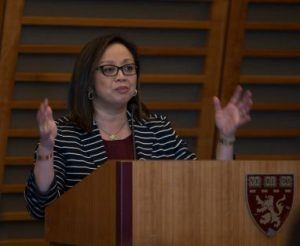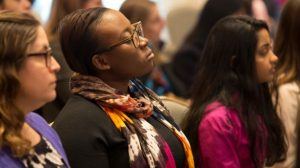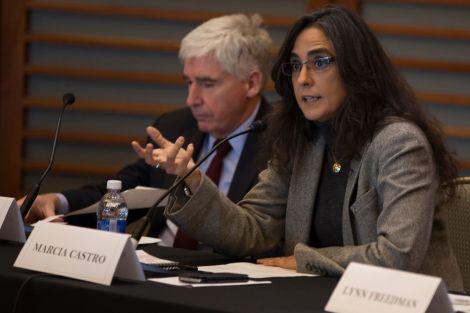March 29, 2017 – An elderly woman struggles to find food, clean water, and a toilet in her slum in India. A Brazilian woman, frightened by violence in her poor section of town, refuses to let a public health worker into her house to check for disease-causing mosquitoes. A young homeless mother in Boston needs shelter for herself and her children in a city with one of the highest housing costs in the nation. These examples highlight the struggles that millions of women and girls living in poverty face while living in the shadow of prosperity in the world’s largest cities.
Their health challenges were spotlighted at Harvard T.H. Chan School of Public Health’s 4th Annual State of Global Health Symposium, entitled “Urban Evolution: Optimizing Women’s Health in the World’s Cities,” held March 22, 2017 at the Joseph B. Martin Conference Center in Boston. The event was sponsored by the Department of Global Health and Population and was part of the department’s 2017 Global Health Week.
The world is becoming more urbanized at a record pace—more than half of the world’s population lives in urban areas, a number predicted to rise by more than 60% by 2030. This produces both opportunities and challenges for the health of women and girls, said Wafaie Fawzi, chair, Department of Global Health and Population, Karen Emmons, Dean for Academic Affairs, and Ana Langer, director of the School’s Women and Health Initiative, in their opening remarks. While cities generally offer more health services, education, and jobs than rural areas, they said city dwellers are at increased risk of exposure to environmental hazards, violence, and mental health issues.
Vulnerable populations hidden from view

Monica Valdes Lupi, executive director of the Boston Public Health Commission, spoke about ways that the Boston Public Health Commission is helping low-income women in the city in her keynote address. With Boston’s high rents, “unmet housing is the number one source of stress for our staff,” she said. Lack of housing can negatively impact people psychologically and adversely impact health, she said. This is one reason why the city provides housing vouchers to homeless pregnant women. Other programs the Commission offers to address inequities range from a program targeting human trafficking and sexual exploitation to a workplace safety program targeting Boston’s 200 nail salons, which she said are primarily run by Vietnamese women. (Read more on the health status of Boston residents in the 2014-2015 Health of Boston Report.)
In a panel discussion on the state of women’s health in cities, Lynn Freedman, professor of population and family health at Columbia University, talked about the “deeply vulnerable” population of poor women and girls who are hidden from view in the world’s cities. “They often have jobs that are not on the books. Their housing is illegal. They lack access to water, sewage, and power. Their neighborhoods are crime-ridden. They have no legal protections,” she said.
Panelist Marcia Castro, associate professor of demography at Harvard Chan School, discussed the poverty she has seen in Brazil and other parts of the world as she and her colleagues have worked to eradicate mosquito-borne diseases in slums. It can be challenging to engage the people when sometimes even their governments won’t live up to promises to provide clean water and sanitation, she said.

Günther Fink, associate professor of international health economics at Harvard Chan, said in his research in Africa and elsewhere he has seen many fragmented families in which a mother with several children is struggling to survive following a divorce or death of their husband. “There also are a lot of isolated single women in old age who are unable to work, have no government or family support, and have mental health needs,” he said. “It’s hard to find treatment when resources are short.”
Innovative solutions are needed to address the health needs of women and girls in cities, the speakers agreed. Public health researchers must build interdisciplinary bridges with urban planners, educators, economists, and politicians to foster healthy cities rooted in gender equity. Emmons said she hopes the symposium will lead to new collaborations anchored in research, education, and service to make cities better for women and girls.
photos: Sarah Sholes
